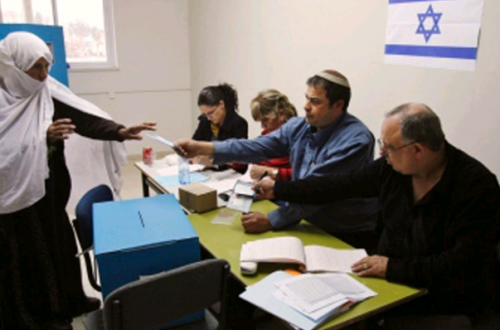This is a Cross Post from The Spectator
By Isabel Hardman
the original can be viewed here

The Prime Minister and Baroness Warsi clashed over the government’s counter-extremism strategy while the minister was on a plane. Picture: Getty
The government has failed to produce an adequate strategy to tackle non-violent extremism because the minister in charge of it is said to disagree with the Prime Minister’s approach, sources have told Coffee House.
Baroness Warsi is alleged by multiple sources in and out of government to have consistently resisted calls to develop a proper strategy on integration and tackling extremism at its roots, even though this is the Prime Minister’s policy and part of her job at the Communities and Local Government department. One source says: ‘Sayeeda made clear when she got the job at CLG that she didn’t agree with the Prime Minister and that she simply wasn’t going to do this bit of her job.’ The minister has clashed with the Prime Minister over his efforts to tackle extremism, most notably during the drafting of a report from the Extremism Taskforce, when, as Coffee House has previously reported, the pair had an argument while Warsi was on a plane.
The Extremism Taskforce was set up, The Spectator understands, to overcome the difficulty in coming up with any policy to counter non-violent extremism while Warsi held the brief, but the minister objected to the panel consulting experts who she disagreed with, including the Quilliam Foundation, and some of the conclusions of the taskforce, which the Prime Minister set out last winter. Downing Street denies that this was one of the reasons the Taskforce was set up, arguing that it was solely in response to the murder of Lee Rigby. An integration strategy was published in 2012, but sources tell Coffee House that it is widely considered inadequate.
Warsi is alleged to disagree with the Prime Minister’s approach that he laid out in his 2011 Munich speech on extremism, and is alleged to face no pressure from senior ministers in the Communities and Local Government department on this matter. One Westminster source says: ‘Eric [Pickles] is not particularly interested in this issue, and so it is easy for her not to do anything.’
Former Home Office minister Baroness Neville-Jones is concerned by a lack of drive and funding for a successful integration strategy. She says:
‘There has to be a conscious integration programme and it certainly needs to include young people who are Muslims, but not just young Muslims, it has to cover whole parts of our society. It has to be organised in a way which appeals to young people.
‘There needs to be some government money and support in this because we have got to get these things going. It needs commitment from every part of government at all levels to see this happen. As things stand, I do not think there’s enough money, or enough drive.’
Others who have worked on this feel the problem is bigger than Warsi’s personal convictions. Dominic Cummings, a former adviser to Michael Gove who has recently published research on public attitudes to the EU and the Human Rights Act, says:
‘First, the cross-Whitehall processes for dealing with extremism are a joke. Second, the interaction of the ECHR/Human Rights Act with judicial review, Whitehall processes, and Number 10′s operation makes it impossible for good officials to reverse this. Third, Warsi is hopeless.
‘Fourth, the embedding of lawyers in intelligence services’ operations because of Whitehall interpretations of the Human Rights Act is a disaster. Fifth, it’s a good rule of thumb that when you hear about a group of nutters, the first question to ask is which bit of the state is funding them.’
The Government denies these criticisms. A source says:
‘These allegations are simply not true. The Government has an agreed strategy on tackling extremism and encouraging integration which all ministers support.’
And the Communities and Local Government department rejects the suggestion that Warsi disagrees with the Prime Minister and has been resisting developing a proper strategy, and that Pickles is insufficiently interested in this area to pressure his junior minister. A DCLG ministerial spokesman says:
‘DCLG ministers are committed to confronting and challenging extremism in all its forms, tackling the violence and hatred that seeks to create division. We are championing what unites our country across class, colour and creed.
‘We have rejected Labour’s Prevent programme, which created resentment, undermined community cohesion and wasted taxpayers’ money.’


